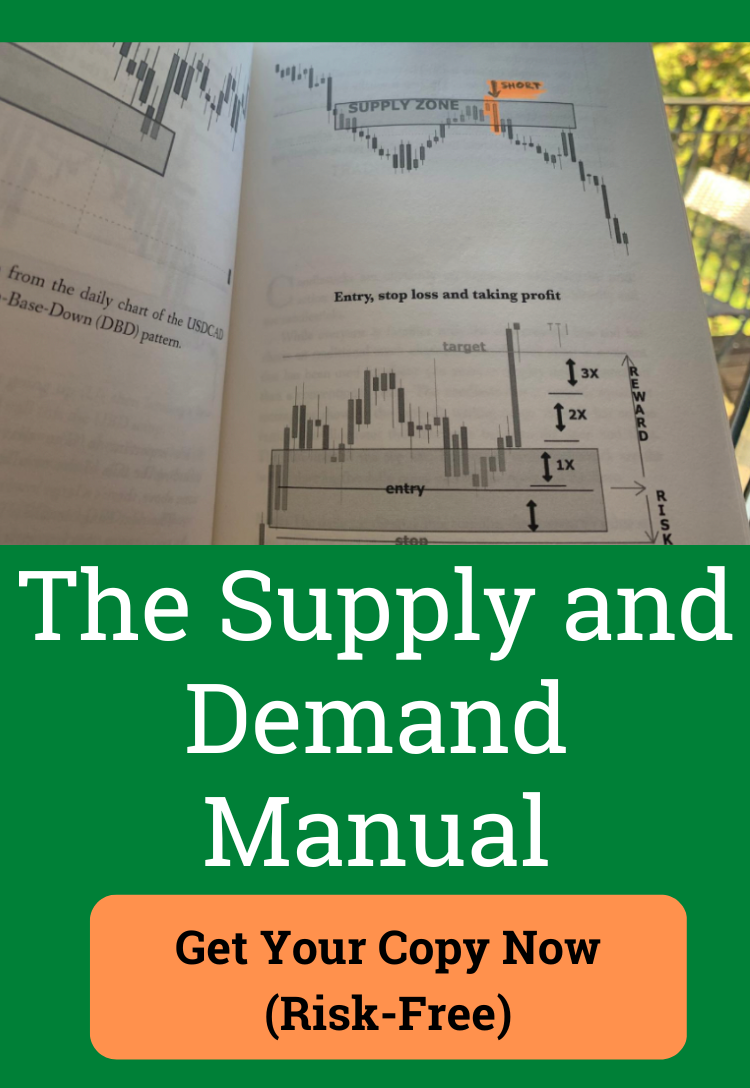7 Unbiased Online Trading Academy Reviews for 2025
Choosing an online trading academy is one of the most critical decisions you'll make in your trading journey. The right guidance can accelerate your path to profitability, while the wrong choice can lead to significant frustration and financial loss. With countless platforms making bold promises, how do you separate genuine value from slick marketing hype? This comprehensive guide cuts through the noise.
We've compiled detailed, unbiased online trading academy reviews from a wide range of sources. You'll find insights from dedicated trading educators like Colibri Trader alongside feedback from established consumer watchdogs like the Better Business Bureau (BBB) and the U.S. Federal Trade Commission (FTC). We also dive deep into platforms built entirely on real user experiences, such as Trustpilot, Yelp, and Sitejabber, giving you a complete picture of customer satisfaction and potential red flags.
Our goal is to equip you with a 360-degree view of what to expect before you invest your time and money. For each source, we provide a clear breakdown of its purpose, how to effectively search for reviews, and what specific information to look for. We've included screenshots for visual guidance and direct links to help you start your research immediately.
Whether you are a novice trader seeking a solid foundation, an intermediate trader needing to build consistency, or an experienced professional looking to refine a specific skill set, this roundup will help you identify an educational partner that aligns with your financial goals. Consider this your roadmap to making a well-informed decision and finding the best fit for your learning style and trading ambitions.
1. Colibri Trader
Colibri Trader has established itself as a premier destination for traders seeking to master the art of price action, earning its place as a top-tier choice in many online trading academy reviews. The platform distinguishes itself by stripping away the complexity often associated with financial markets, such as confusing indicators and overwhelming fundamental data. Instead, it provides a laser-focused curriculum on reading and interpreting pure price movements, a skill that is timeless and applicable in any market condition, whether bullish or bearish. This streamlined approach empowers traders to make decisions with clarity and confidence.
The learning journey is uniquely tailored from the very beginning. Prospective students can take a free Trading Potential Quiz, an insightful tool designed to personalize their educational path based on their current knowledge and goals. This commitment to a bespoke experience ensures that both novices and seasoned professionals find immediate value.
.
Core Strengths and Standout Features
Colibri Trader’s core philosophy is built on an indicator-free methodology that simplifies the trading process. This approach is not just theoretical; it is a practical, actionable system proven to work by a community of over 8,000 students. The platform’s strength lies in its structured, progressive learning paths.
- Comprehensive Course Structure: The curriculum is intelligently designed to guide traders from foundational concepts to advanced strategies. Programs range from the Basic Course for newcomers to the specialized Ultimate Supply & Demand and Day Trading courses for experienced practitioners.
- Accessible High-Quality Content: Students gain instant access to the first two chapters of an Amazon bestselling book on price action, providing immediate, high-value insights without any initial investment.
- Personalized Mentorship: Beyond a set of videos, Colibri Trader offers dedicated mentorship. This direct access to an experienced mentor is a significant advantage, providing personalized feedback and guidance crucial for overcoming trading hurdles.
- Focus on Trader Psychology: The courses go beyond technical chart analysis, dedicating significant attention to the often-overlooked pillars of success: trading discipline and robust money management.
User Experience and Program Access
The platform is designed for ease of use, allowing students to learn at their own pace from anywhere in the world. The content is delivered through practical, easy-to-digest lessons that prioritize real-world application over abstract theory. The strong sense of community, validated by hundreds of glowing testimonials, provides an invaluable support system where traders can share experiences and reinforce their learning.
Access to the programs is straightforward, with clear pricing for each course level. While Colibri Trader does not offer formal certificates, its value proposition is centered on delivering tangible results: consistent profitability and enhanced trading confidence.
| Feature Comparison | Colibri Trader | Typical Competitors |
|---|---|---|
| Primary Methodology | Pure Price Action (Indicator-Free) | Often indicator-heavy or complex systems |
| Personalization | Free Trading Potential Quiz | Generic, one-size-fits-all curriculum |
| Mentorship | Direct access to experienced mentors | Limited or non-existent personal support |
| Community | Strong, with thousands of success stories | Varies, can be unmoderated or inactive |
| Certification | No formal certificates (focus on results) | Often provides certificates of completion |
| Introductory Content | Free access to bestselling book chapters | Limited free content, requires upfront payment |
Pros and Cons
Pros:
- Clarity and Simplicity: The indicator-free price action method removes unnecessary complexity, leading to clearer and more confident trading decisions.
- Structured Learning Path: Courses are well-organized, catering to everyone from absolute beginners to advanced traders looking to refine their strategies.
- Strong Community and Mentorship: The combination of an active community and accessible mentors creates a powerful support environment for learning and growth.
- Affordable and High-Value: The platform offers exceptional value, providing access to professional-grade education and resources at a competitive price point.
Cons:
- No Formal Accreditation: Traders seeking a formal diploma or certificate for professional accreditation will not find it here.
- Niche Focus: The curriculum is centered exclusively on price action. Traders who want to integrate complex indicators or deep fundamental analysis into their strategy may need to seek supplementary resources.
For more information and to begin your trading journey, visit the official website: https://www.colibritrader.com
2. Trustpilot
For those seeking unfiltered and large-scale customer feedback, Trustpilot stands as an essential resource for comprehensive Online Trading Academy reviews. Unlike a single blogger's opinion or a curated testimonial page, Trustpilot aggregates thousands of recent user experiences from across the United States. This volume provides a powerful, crowd-sourced perspective on the academy's performance over time.
The platform’s real strength lies in its granularity. Users can see a detailed breakdown of star ratings, from one-star to five-star, which helps identify common praises and recurring complaints. This data-driven approach moves beyond a simple average score, offering a more nuanced understanding of customer sentiment.
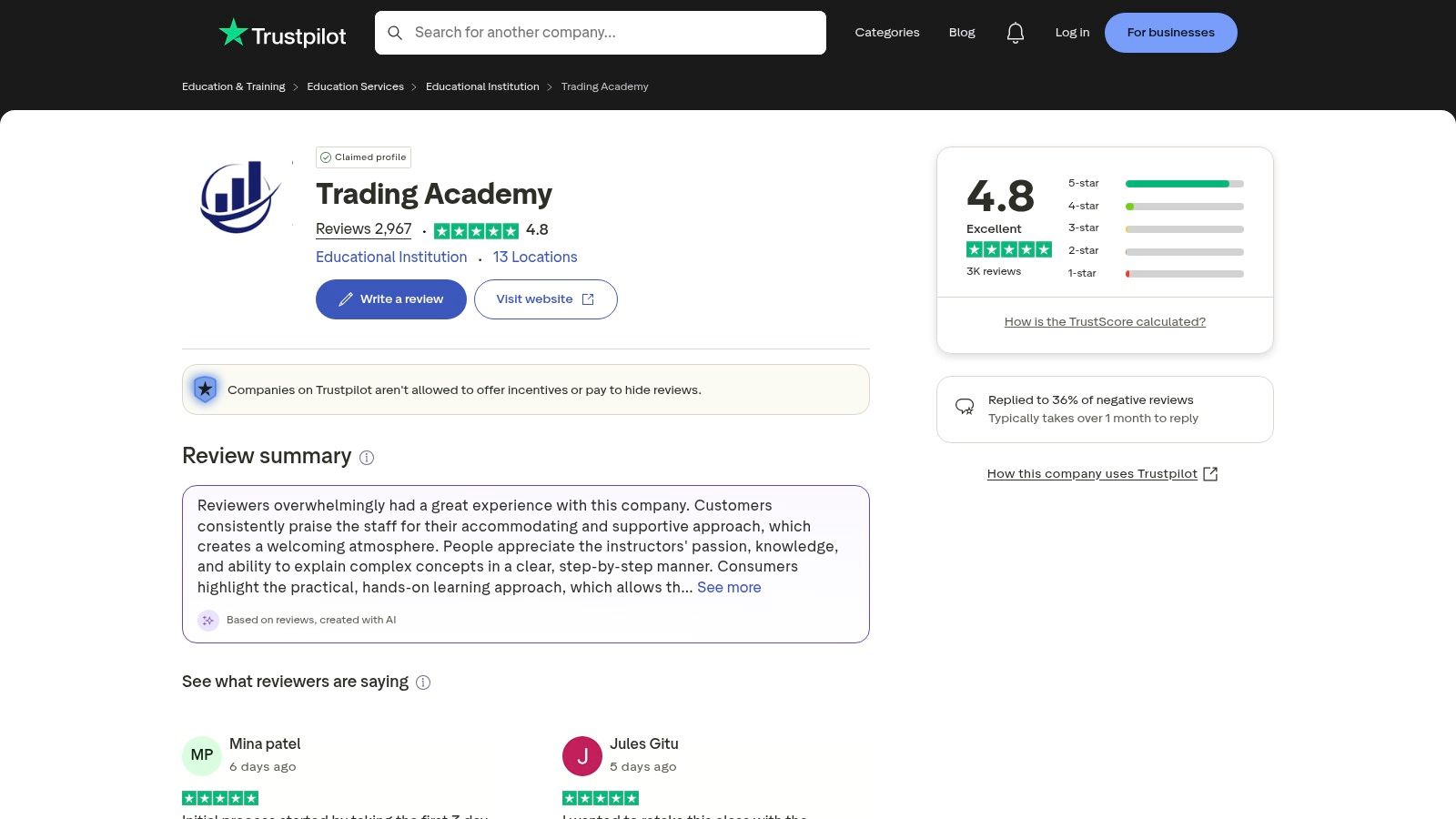
Key Features and How to Use Them Effectively
Trustpilot offers several tools to help prospective students sift through the noise and find relevant information. Its user-friendly interface is free to access, making it a low-barrier first step in your research.
- Location-Specific Pages: A standout feature is the ability to view reviews for specific Online Trading Academy locations. This allows you to assess the quality of instruction and support at the center nearest to you, as experiences can vary significantly from one branch to another.
- Filtering and Sorting: To get the most current insights, use the "sort by date" function to see what recent students are saying. You can also filter by star rating to isolate the most critical or most positive feedback, helping you quickly identify specific issues or highlights.
- Company Replies and Transparency: Look for reviews where Online Trading Academy has posted a reply. This interaction can offer insight into their customer service process and how they handle disputes or negative feedback. Trustpilot also flags reviews that have been reported or appear suspicious, adding a layer of transparency.
- "Verified" Indicators: Prioritize reading reviews with a "Verified" tag. This indicates that Trustpilot has taken extra steps to confirm the reviewer had a genuine buying or service experience, increasing the credibility of the feedback.
Pro Tip: When analyzing reviews, pay attention to the details. Vague complaints or praises are less helpful than specific comments about course content, instructor quality, post-course support, or sales tactics. Look for patterns across multiple reviews to form a balanced opinion. For a broader understanding of trading fundamentals before committing to a course, you can find helpful resources for trading for beginners on colibritrader.com.
Pros and Cons
| Pros | Cons |
|---|---|
| High Volume of Reviews: Offers a broad and current view of sentiment. | Potential for Fake Reviews: Susceptible to manipulation despite verification efforts. |
| Location-Specific Insights: Compare experiences at different local centers. | Lack of Expert Analysis: Reviews are from customers, not necessarily trading experts. |
| Free and Accessible: No cost to browse or post reviews. | Emotional Bias: Reviews can sometimes be overly positive or negative. |
| Transparency Features: Company replies and flags help vet credibility. |
Ultimately, Trustpilot is a powerful tool for gauging public opinion. While it should be one of several resources you consult, its sheer volume of user-generated Online Trading Academy reviews makes it an indispensable part of any thorough due diligence process.
Website: https://www.trustpilot.com/review/www.tradingacademy.com
3. Better Business Bureau (BBB)
For prospective students prioritizing consumer protection and official complaint histories, the Better Business Bureau (BBB) offers a crucial lens for evaluating Online Trading Academy reviews. Distinct from platforms focused on general sentiment, the BBB provides a formal record of consumer disputes and the company's responses. This makes it an invaluable tool for due diligence, particularly for identifying long-term patterns in customer service and business practices.
The platform's primary value lies in its structured complaint resolution process. When a consumer files a complaint, the BBB facilitates communication with the business, and the entire history, from initial issue to final resolution, is documented. This focus on accountability provides a different kind of insight than a simple star rating, showing how the academy handles serious grievances.
Key Features and How to Use Them Effectively
The BBB's business profile for Online Trading Academy is a dense resource of information. It is free to access and serves as a formal checkpoint for anyone considering a significant financial investment in a trading course.
- Complaint History and Details: The core feature is the detailed log of customer complaints filed over the past several years. Each entry typically includes the nature of the complaint (e.g., problems with product/service, advertising issues) and the company's response, offering a transparent look at how disputes are managed.
- Business Profile Information: The BBB provides essential business details, such as how long the company has been in operation, alternative business names, and contact information. This helps verify the legitimacy and history of the organization.
- Alerts and Government Actions: Pay close attention to the "Alerts and Actions" section. The BBB posts critical information here, including any government actions or significant patterns of complaints that consumers should be aware of before engaging with the business.
- Customer Reviews vs. Complaints: The BBB separates formal complaints from general customer reviews. While the reviews section is present, the complaint data is often more revealing about serious, unresolved issues that escalated beyond the company's internal support channels.
Pro Tip: When reviewing complaints, focus on the substance and the company's response. A high number of complaints isn't always a red flag for a large company, but a pattern of unresolved complaints or dismissive responses is. Look for recurring themes, such as issues with refund policies or sales promises not being met.
Pros and Cons
| Pros | Cons |
|---|---|
| Strong Due Diligence Source: Excellent for spotting recurring complaint trends. | Focus on Negativity: The platform is complaint-driven, offering fewer positive insights. |
| Trusted Consumer Organization: A well-known and respected U.S. consumer resource. | Less Granular Filtering: The interface offers fewer sorting options than other review sites. |
| Free to Access: All complaint data and business details are publicly available. | Primarily U.S.-Centric: Less relevant for students outside the United States. |
| Transparent Resolution Process: Shows how the company handles formal disputes. |
In summary, the Better Business Bureau should be a mandatory stop in your research process. While it may not provide the balanced sentiment found on other platforms, its detailed complaint history offers an unmatched perspective on Online Trading Academy's commitment to customer satisfaction and ethical business practices.
Website: https://www.bbb.org/us/ny/new-york/profile/business-school/online-trading-academy-0121-112396
4. Yelp
For those investigating the physical locations of the Online Trading Academy, Yelp provides a treasure trove of experience-rich reviews that often go deeper than other platforms. It's particularly powerful for getting a feel for the flagship Irvine, California headquarters, offering detailed narratives about the in-person experience, from the initial sales process to classroom dynamics.
Yelp excels at capturing long-form, personal stories. Reviewers frequently discuss specific interactions with staff, the pressure of upsells, and detailed opinions on course content and pricing structures. This narrative style provides a qualitative depth that complements the quantitative data found on other review sites, making it a key resource for a comprehensive set of Online Trading Academy reviews.
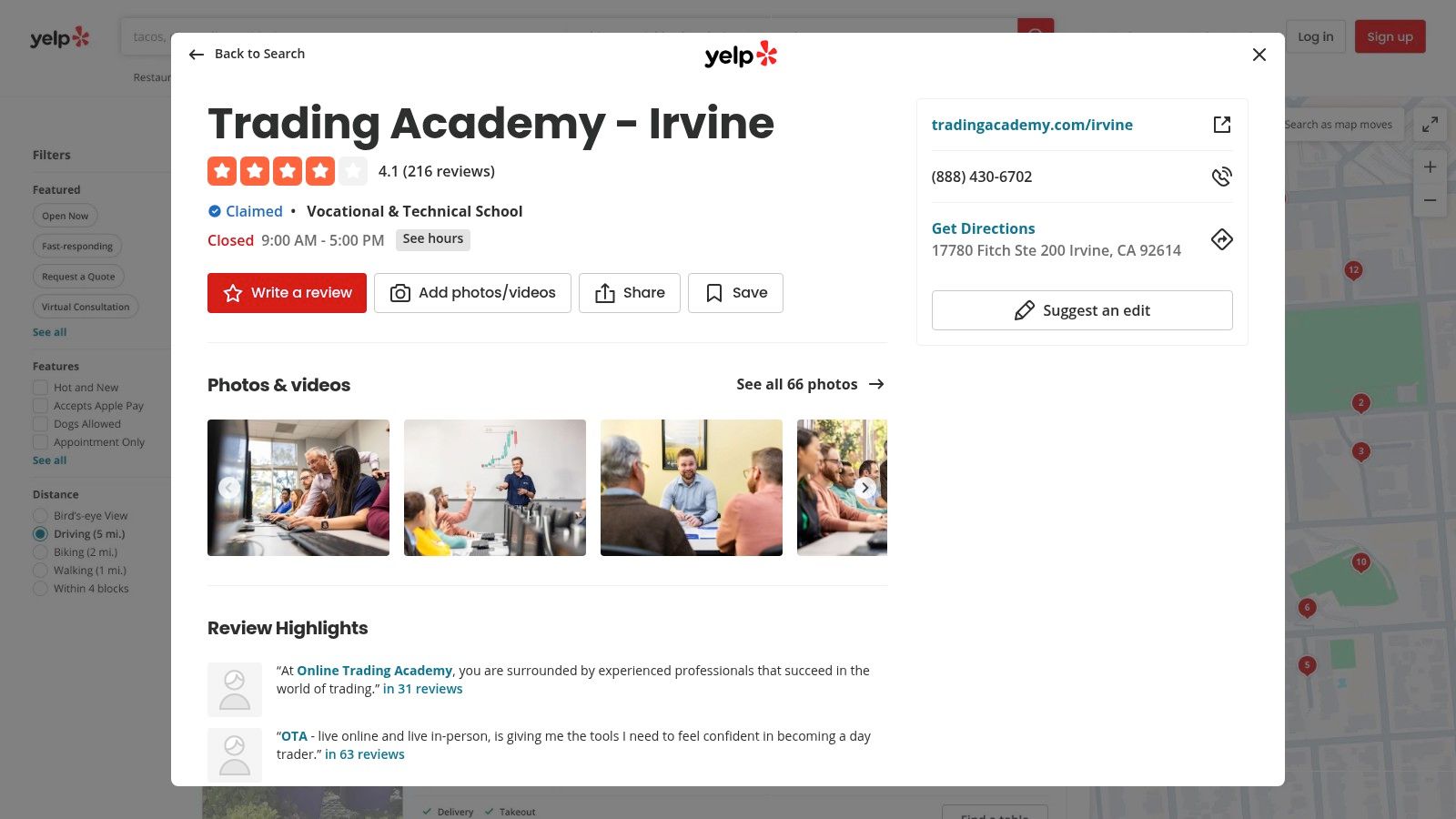
Key Features and How to Use Them Effectively
Yelp’s platform, while known for restaurant reviews, offers powerful tools for vetting educational institutions like the Online Trading Academy. Access is free, allowing prospective students to dig into granular, location-based feedback.
- Detailed, Multi-Paragraph Reviews: Unlike sites that encourage brief comments, Yelp is home to detailed personal stories. Look for reviews that walk you through the entire student journey, from the introductory seminar to post-course support. These often contain specific details about pricing and program nuances not found elsewhere.
- Photos and Business Information: Users often upload photos of the facilities, giving you a virtual tour of the learning environment. The platform also centralizes key business information like operating hours and contact details for specific branches.
- Sorting and Filtering: Use the sorting functions to view reviews by "Newest First" for the most current perspectives. You can also sort by rating to quickly isolate the most positive or critical feedback, which is useful for identifying common themes and recurring issues.
- Focus on Local Experience: Yelp’s core strength is its local focus. If you are considering attending classes at a physical center, especially the Irvine headquarters, Yelp provides unparalleled insight into the local staff, facility quality, and community atmosphere.
Pro Tip: Be aware that Yelp's recommendation algorithm can sometimes filter out legitimate reviews. Always check the "not currently recommended" section at the bottom of a business page to see reviews that have been hidden. These can often contain valuable, albeit critical, insights.
Pros and Cons
| Pros | Cons |
|---|---|
| Rich Narratives: In-depth stories often mention pricing and service details. | Aggressive Filtering: Yelp’s algorithm can hide legitimate reviews. |
| Location-Specific Focus: Excellent for researching physical centers like Irvine. | Fragmented Listings: Reviews for the same business may be split across multiple pages. |
| Multimedia Content: User-submitted photos provide a view of the facilities. | Local Bias: Less useful for reviewing the purely online aspect of the academy. |
| Balanced Feedback: Often contains a good mix of positive and negative reviews. |
Ultimately, Yelp is an invaluable tool for anyone considering attending the Online Trading Academy in person. Its focus on detailed, narrative-style Online Trading Academy reviews offers a ground-level perspective on the student experience that is difficult to find on broader, more data-centric platforms.
Website: https://www.yelp.com/biz/trading-academy-irvine-irvine-4
5. PissedConsumer
For prospective students looking to stress-test the marketing claims of Online Trading Academy, PissedConsumer offers a raw and unfiltered look at the other side of the coin. This platform specializes in consumer complaints, providing a concentrated collection of negative Online Trading Academy reviews. While general review sites offer a mix of opinions, PissedConsumer is designed to highlight recurring problems and worst-case scenarios, making it a crucial resource for due diligence.
The platform's primary value is its focus on specific grievances. Instead of generic star ratings, you find detailed narratives from former students outlining issues with sales tactics, financing arrangements, customer service responsiveness, and the perceived gap between promised and actual value. This level of detail helps you identify potential red flags to watch for during your own interactions with the academy.
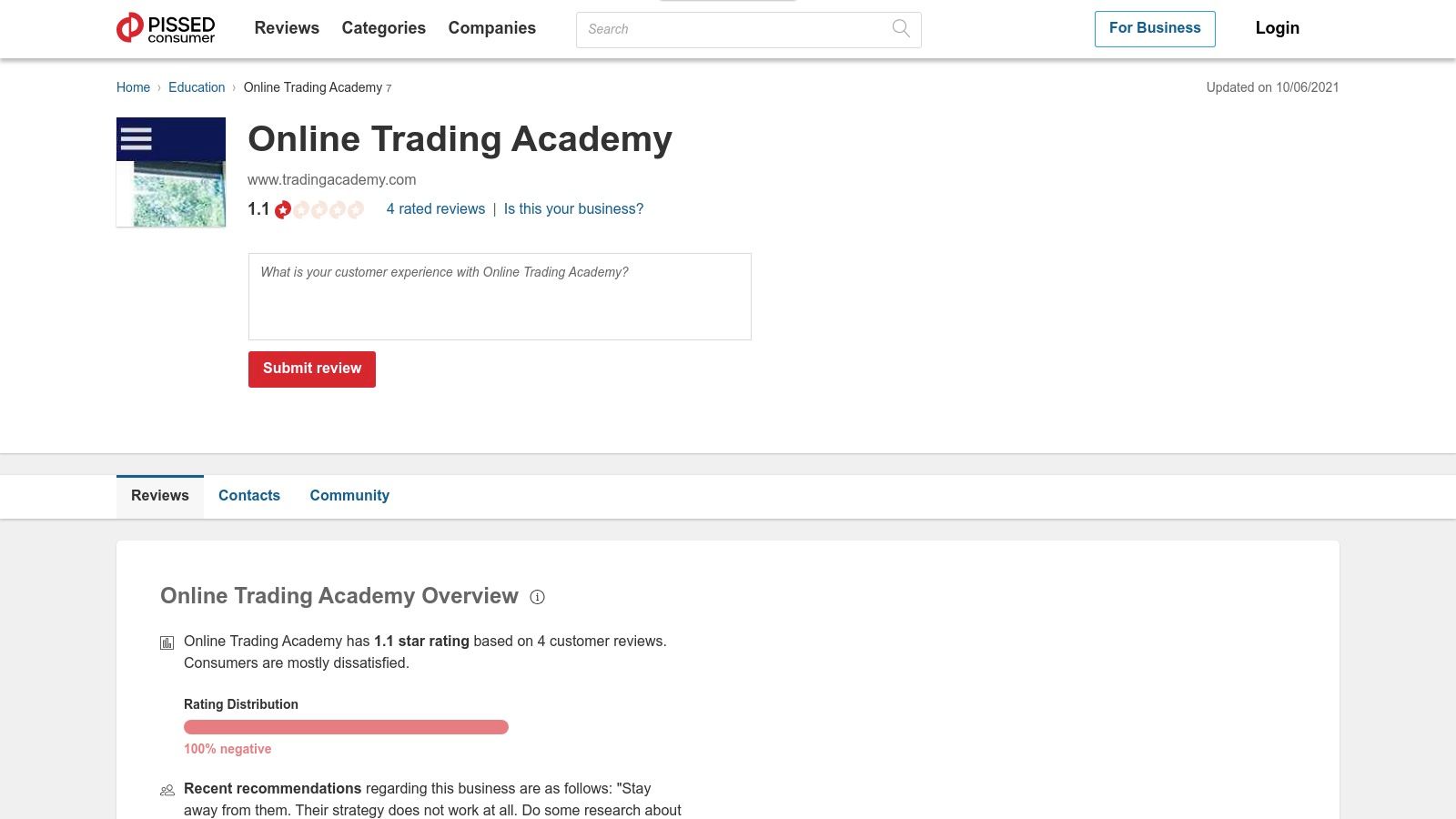
Key Features and How to Use Them Effectively
PissedConsumer provides several tools that allow you to analyze complaints systematically. The platform is entirely free to browse, serving as a powerful counter-balance to the positive testimonials often featured in marketing materials.
- Thematic Complaint Tags: A key feature is the organization of complaints into categories like "Product/Service," "Billing Issues," "Refunds," and "Staff." This allows you to quickly drill down into the areas that concern you most, whether it's the quality of the education or the financial commitment.
- Comment Threads and Discussions: Each complaint can spawn a discussion thread where other users share similar experiences or offer advice. These conversations provide additional context and can reveal whether a particular issue is an isolated incident or a widespread problem.
- Company Response Tracking: In some cases, Online Trading Academy may respond directly to a complaint on the platform. Monitoring these interactions gives you insight into how the company addresses criticism and handles customer disputes in a public forum.
- Focus on Detailed Narratives: The platform encourages users to provide lengthy, detailed accounts of their experiences. Read these narratives carefully to understand the specific circumstances that led to dissatisfaction.
Pro Tip: Use PissedConsumer not as a final verdict, but as a tool to formulate critical questions. If you notice a pattern of complaints about a specific course or a high-pressure sales tactic, you can address these points directly with an academy representative before making any commitment.
Pros and Cons
| Pros | Cons |
|---|---|
| Concentrated Critical Feedback: Highlights persistent and recurring concerns. | Heavily Skewed Negative: The platform’s nature means you won't get a balanced view. |
| Reveals Potential Red Flags: Uncovers issues not always visible on mainstream sites. | May Contain Outdated Information: Some complaints might not reflect current practices. |
| Free and Open Access: No cost to access detailed user complaints. | Lacks Formal Verification: Complaints are user-submitted and may lack full context. |
| Detailed User Narratives: Offers specific scenarios instead of just ratings. |
In conclusion, PissedConsumer is an essential stop for anyone performing a thorough investigation into Online Trading Academy. By intentionally focusing on negative experiences, it provides the critical perspective needed to balance the academy's official marketing and form a well-rounded, informed opinion.
Website: https://www.pissedconsumer.com/online-trading-academy/RT-F.html
6. Sitejabber
For those looking to supplement their research with another layer of consumer feedback, Sitejabber provides a valuable, independent perspective on Online Trading Academy reviews. While it doesn't have the sheer volume of larger platforms, it serves as an excellent cross-referencing tool, offering a different pool of user experiences that can help confirm or challenge the trends seen elsewhere. This makes it a useful stop for a more well-rounded due diligence process.
The platform's value lies in its straightforward presentation of consumer sentiment. It aggregates user ratings, provides detailed written feedback, and includes its own authenticity signals. This allows prospective students to quickly get a snapshot of what other customers are saying, providing another data point in their decision-making journey.
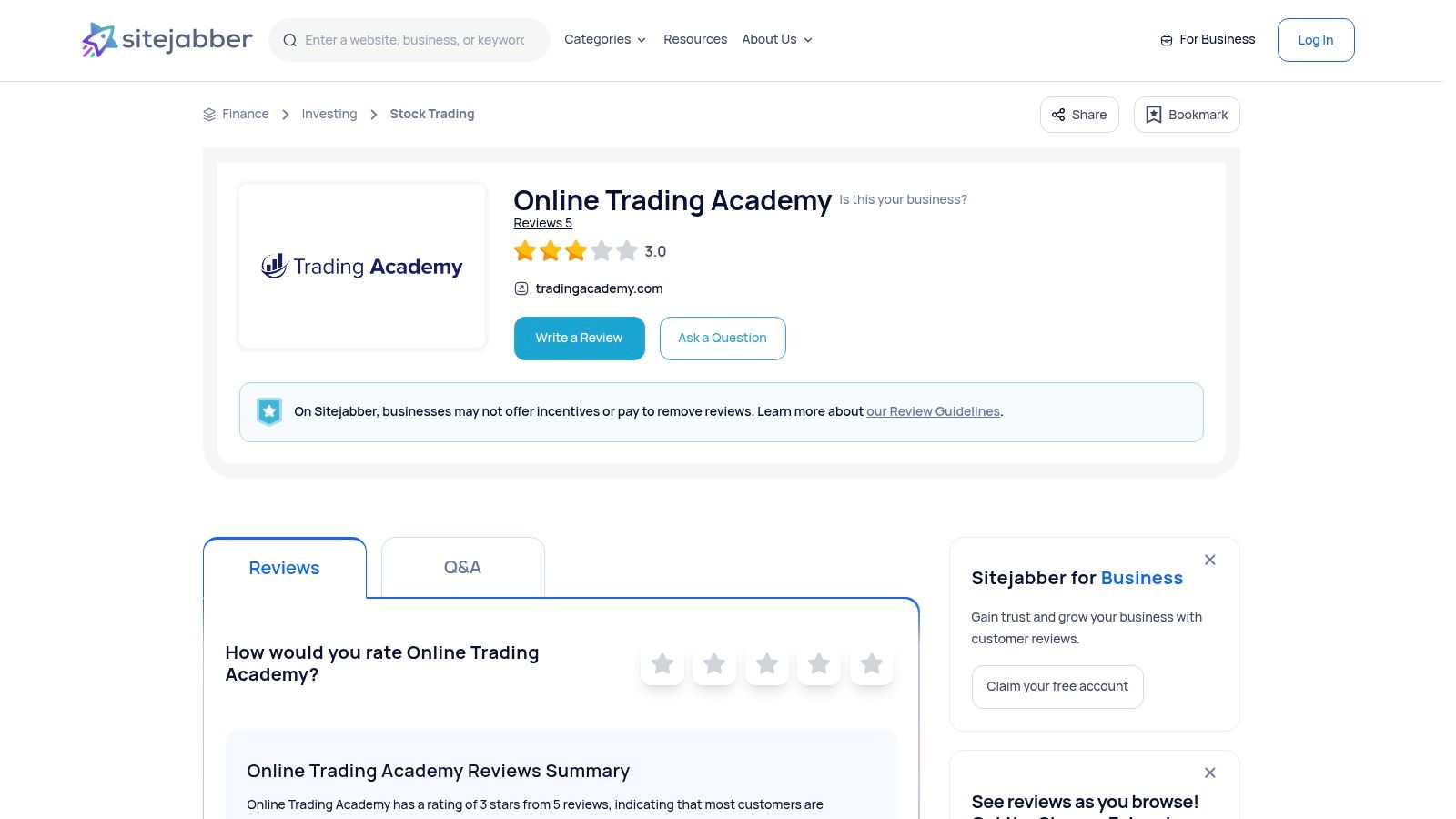
Key Features and How to Use Them Effectively
Sitejabber’s interface is simple and free to use, focusing on delivering consumer reviews without unnecessary complexity. Its features are designed to help you quickly assess a company’s reputation based on customer feedback.
- Review Authenticity Monitoring: Sitejabber employs its own tools to monitor the authenticity of reviews. This adds a layer of confidence that the feedback is from genuine customers, helping to filter out potentially fabricated content.
- Star Ratings and Timestamps: Each review is accompanied by a clear star rating and a timestamp. This allows you to quickly gauge sentiment and check the recency of the feedback, which is crucial in the fast-changing world of online education.
- Category Ranking: The platform provides a ranking for Online Trading Academy within its "Stock Trading" category. This gives you a comparative sense of how the academy stacks up against other services in the same industry, according to Sitejabber users.
- Differing Perspectives: Due to its smaller user base compared to giants like Trustpilot, you may find different anecdotes or a slightly different sentiment average. This can be useful for identifying outlier experiences, both positive and negative.
Pro Tip: Use Sitejabber to validate patterns you've identified on other review sites. If you see a specific complaint mentioned frequently on a larger platform, check if the same issue appears here. Consistent themes across multiple independent sites lend more credibility to the feedback. Understanding these potential pitfalls is a key part of financial preparedness, similar to the importance of applying solid trading risk management strategies.
Pros and Cons
| Pros | Cons |
|---|---|
| Offers an Independent Signal: Provides a viewpoint separate from the biggest review sites. | Low Review Volume: A small number of reviews means outliers can heavily skew the average rating. |
| Easy to Gauge Sentiment: The simple layout makes for a quick and easy assessment. | Older Reviews: The review pool may not be as current, reducing the relevance of some feedback. |
| Free and Accessible: No cost to browse reviews or contribute your own experience. | Best Paired with Other Sources: It is less effective as a standalone research tool. |
In summary, Sitejabber is a solid secondary source for gathering Online Trading Academy reviews. While its limited volume means it shouldn't be your only point of research, its independent nature and focus on authenticity make it a worthwhile addition to your investigative toolkit, helping you build a more complete picture of customer satisfaction.
Website: https://www.sitejabber.com/reviews/tradingacademy.com
7. U.S. Federal Trade Commission (FTC)
While not a traditional review platform, the U.S. Federal Trade Commission (FTC) website is an indispensable resource for any serious investigation into Online Trading Academy reviews. It provides official, authoritative information regarding the company's past legal issues, including a significant settlement over deceptive claims. This government-level oversight offers critical context that you won't find on consumer-driven review sites, helping you understand the legal framework governing the academy's current operations.
The FTC’s materials cut through marketing language and user opinions to present factual, documented findings. For prospective students, this information is vital for verifying claims and understanding the history behind the company's educational promises and business practices. It serves as a foundational piece of due diligence, offering a sober counterpoint to both glowing testimonials and disgruntled complaints.
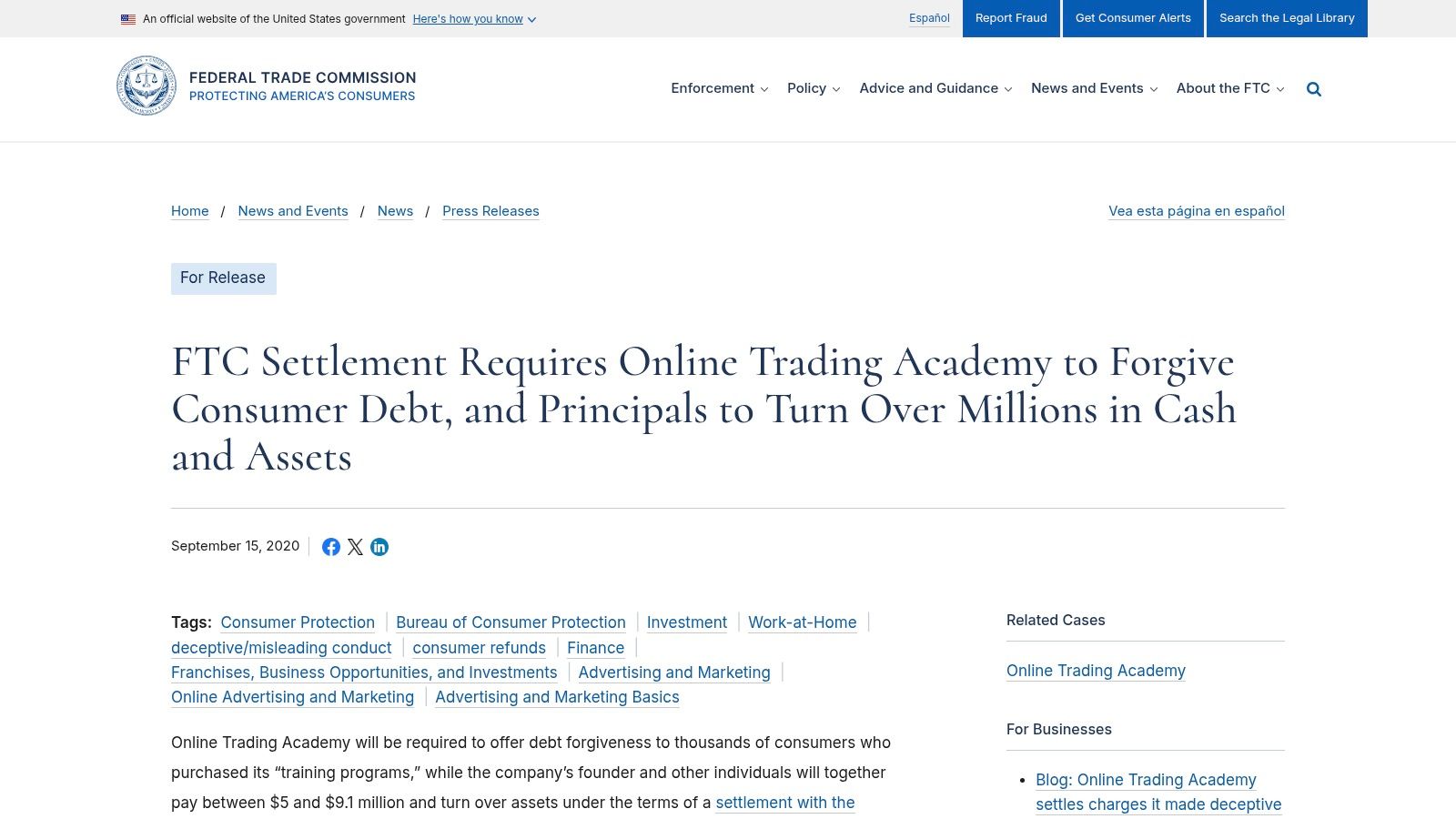
Key Features and How to Use Them Effectively
The FTC website is a free public resource that provides official documentation. Navigating it effectively allows you to build a complete picture of Online Trading Academy’s regulatory history.
- Official Press Releases: Search for "Online Trading Academy" to find the original press releases detailing the FTC's enforcement action and the terms of the settlement. This is the primary source for understanding the specific allegations made and the remedies imposed.
- Consumer Alerts and Guidance: The FTC published guidance for affected consumers regarding debt forgiveness and their rights post-settlement. Reviewing these alerts helps you understand the financial implications for past students and the restrictions placed on the company.
- Details on Marketing Restrictions: The settlement documents outline specific marketing claims Online Trading Academy is prohibited from making. Knowing these restrictions allows you to critically evaluate their current advertising and sales pitches for compliance.
- Information on Review "Gag Clauses": The FTC action addressed clauses that may have prevented past students from posting negative reviews. Understanding this history is crucial when assessing the balance of positive versus negative feedback found on other platforms.
Pro Tip: Use the information from the FTC as a lens through which to view other Online Trading Academy reviews. When you see a review mentioning a refund or debt relief, the FTC documents provide the official context for why that might have occurred. This allows you to separate individual grievances from court-mandated actions.
Pros and Cons
| Pros | Cons |
|---|---|
| Authoritative and Factual: Provides unbiased, government-verified information. | No User-Generated Reviews: Lacks the personal experiences found on other sites. |
| Clarifies Legal Context: Explains the "why" behind some consumer complaints. | Focus on Past Issues: Information is historical and may not reflect current operations. |
| Free and Publicly Accessible: No cost or sign-up required to access data. | Requires Interpretation: You must read the legal documents to understand the nuances. |
| Highlights Marketing Restrictions: Helps you spot potentially deceptive claims. |
Ultimately, the FTC website is not a place to find star ratings but a crucial source for background diligence. It equips you with the necessary legal and historical context to intelligently interpret the thousands of personal Online Trading Academy reviews you will encounter elsewhere, making you a more informed and discerning consumer.
7-Source Online Trading Academy Review Comparison
| Item | Implementation Complexity 🔄 | Resource Requirements ⚡ | Expected Outcomes 📊 | Ideal Use Cases 💡 | Key Advantages ⭐ |
|---|---|---|---|---|---|
| Colibri Trader | Moderate (structured courses and mentorship) | Moderate (time and commitment to learn) | Improved trading skills and consistent profits | Traders wanting price action mastery and mentorship | Clear, indicator-free methods; personalized path |
| Trustpilot | Low (browsing and filtering reviews) | Minimal (internet access) | Detailed, current customer sentiment snapshots | Consumers researching trading academy reputations | High review volume; local insights; free access |
| Better Business Bureau | Low (accessing complaint records) | Minimal (internet access) | Awareness of complaint trends and business conduct | Due diligence and complaint history checks | Trusted complaint data; complaint resolution info |
| Yelp | Low (reading narrative reviews) | Minimal (internet access) | Rich qualitative insights including pricing | Local experience and detailed customer feedback | Detailed reviews with photos; service nuances |
| PissedConsumer | Low (reading complaint-focused content) | Minimal (internet access) | Critical perspective on persistent problems | Stress-testing expectations via negative feedback | Concentrated negative feedback; thematic tags |
| Sitejabber | Low (reading independent reviews) | Minimal (internet access) | Supplementary sentiment snapshots | Quick general sentiment gauge beyond big platforms | Independent perspective; authenticity monitoring |
| U.S. Federal Trade Commission (FTC) | Low (accessing official info) | Minimal (internet access) | Authoritative legal context on company actions | Understanding regulatory and legal background | Official enforcement and consumer guidance info |
Making Your Final Decision: Which Trading Academy is Right for You?
Navigating the landscape of online trading education requires a sharp eye and a methodical approach. As we've explored through this deep dive into online trading academy reviews, your decision-making process should be a multi-faceted investigation, not a single-source glance. Relying solely on one platform, whether it's the user-generated passion of Yelp or the formal dispute resolution of the Better Business Bureau, gives you only one piece of a much larger puzzle. The most empowered prospective students are those who synthesize information from diverse sources to build a complete, unbiased picture.
This comprehensive analysis has highlighted a crucial truth: the best insights come from cross-referencing different types of feedback. While consumer-facing sites like Trustpilot and Sitejabber offer a real-time pulse on customer satisfaction and recent experiences, they must be balanced with the structured, long-term data provided by organizations like the BBB. Even more critically, the regulatory actions documented by the U.S. Federal Trade Commission (FTC) serve as a vital, non-negotiable check, revealing any serious historical issues that slick marketing might otherwise obscure. This blend of real-time sentiment and historical conduct is your most powerful tool for vetting any educational provider.
A Framework for Your Personal Due Diligence
To move from analysis to action, you need a personalized evaluation framework. Your trading goals, learning preferences, and risk tolerance are unique, and the right academy will align with those specific needs. Generic, one-size-fits-all programs often fail to deliver because they don't cater to the individual.
Consider these key factors as your final checklist:
- Learning Style: Do you thrive in a structured, mentorship-driven environment, or do you prefer a vast library of self-paced content? An academy like Colibri Trader, with its focus on a singular, repeatable price action strategy, is built for learners who want depth over breadth.
- Strategy and Philosophy: Are you drawn to complex, indicator-heavy systems, or does a clean, minimalist approach to reading charts resonate with you? The philosophy behind an academy's teachings is paramount. A focus on pure price action, for instance, aims to remove the "noise" of lagging indicators, empowering you to make decisions based directly on market behavior.
- Community and Support: What level of interaction and support do you need? Access to a mentor and a community of like-minded traders can be the difference between persevering through challenges and giving up. Evaluate the support systems offered, not just the course content itself.
- Transparency and Track Record: Look beyond the marketing claims. Does the academy have a history of transparent communication and a clear record of addressing issues, as might be documented on the BBB? Or are there unresolved complaints and red flags raised by the FTC?
Key Takeaway: A truly effective evaluation goes beyond star ratings. It involves understanding the context behind the reviews, identifying recurring themes in feedback across multiple platforms, and aligning an academy's core methodology with your personal trading aspirations.
Ultimately, your search for the right trading education is an investment in yourself. The purpose of analyzing online trading academy reviews is not just to avoid scams but to find a genuine partner in your trading journey. It’s about finding a program that doesn't just teach you a set of rules but empowers you with a durable skill. Look for an institution that prioritizes clarity, offers a proven methodology, and provides the support structure necessary to turn knowledge into consistent action. By taking this deliberate and informed approach, you position yourself not just to learn, but to succeed.
If your research has shown you the value of a clear, uncluttered trading strategy backed by direct mentorship, consider exploring Colibri Trader. Our entire program is built on a proven, indicator-free price action methodology designed to give you a definitive edge in the markets. Visit the Colibri Trader website to see how our focused approach can help you achieve your trading goals.


